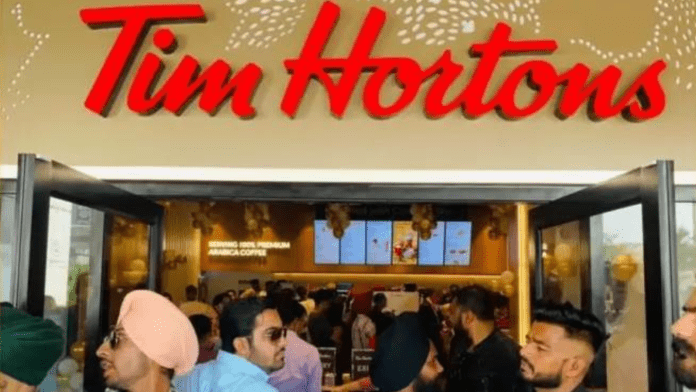Tim Hortons is on a rapid expansion spree in India, demonstrating its commitment to establishing a strong presence in the country. Having initially entered the Indian market in August with a store in Delhi, this renowned Canadian coffee chain has wasted no time in making its mark. With a successful rollout of 13 outlets across the Delhi-NCR and Punjab regions in the north, Tim Hortons is now gearing up for its next milestone: the launch of two new stores in Mumbai. These upcoming openings in Bandra on May 27 and Andheri on May 28 will bring the total number of Tim Hortons stores in India to 15, solidifying its foothold and catering to coffee lovers in yet another major city.
According to Tarun Jain, the CEO of Tim Hortons India, the company has strategically focused on establishing a stronger presence in the northern region before venturing into other areas of the country.
“The response has been fantastic in the north. Whatever targets we set in terms of store performance, expansion or cities we wanted to be in, we’ve exceeded all of that and we’re now in Mumbai and we’re seeing a lot of excitement here after we announced the dates,” Jain added.
In the future, it is expected that Mumbai will witness an increase in the number of Tim Hortons stores. However, immediate expansion plans following the establishment of these stores will be focused on cities near Mumbai, such as Pune, by the end of this year. Additionally, Tim Hortons has intentions to enter Bengaluru in the current year, with ongoing efforts to identify suitable locations for stores. Furthermore, the company has its sights set on cities like Ahmedabad for potential expansion in the future.
Jain, however, emphasizes that Tim Hortons does not have a specific target for the number of stores in the Indian market. Their expansion plans also involve opening additional stores through various channels in existing markets such as Delhi.
Tim Hortons’ entry into Mumbai and its subsequent fast-paced expansion coincides with a thriving coffee culture in India, coupled with intensified competition within the coffee chain industry. In a recent development, Reliance Retail introduced the British coffee chain Pret A Manger to India, which currently operates two stores in Mumbai. Tata Starbucks has also been rapidly expanding its footprint and now boasts 341 stores across the country. In an effort to attract a larger consumer base, Tata Starbucks recently revamped its menu to include smaller-sized and more affordable beverage and food options.
In recent years, a number of homegrown coffee chains such as Subko, Third Wave Coffee, and Blue Tokai have emerged and witnessed substantial expansion in their presence. These homegrown chains have made their mark in the coffee industry, adding to the diverse range of options available to coffee enthusiasts.
According to Jain, competition plays a positive role in a growing market as it fosters market development and drives increased consumption. He emphasizes that Tim Hortons will distinguish itself through its wide variety of offerings, including made-to-order fresh food available at its cafés.
Tim Hortons’ beverage prices align with those of its rivals, Tata Starbucks and Pret, while its food items are available at a starting price as low as INR 39, providing customers with economical choices.
Similar to other international coffee chains that have been placing greater emphasis on adapting their menus to local preferences, Tim Hortons is introducing localized food options on its menus. Alongside globally recognized items like French Vanilla coffee, Java Chip beverage, and Timbits, Tim Hortons is incorporating menu offerings that cater specifically to the local palate.
Read More: Tim Hortons makes striking entrance into Indian market, embraces regional cuisine
“Our learning has been that since we’re an international brand, there’s a set of expectations when we come into a market, a legacy that they expect us to deliver on along with a lot of local love to adapt to tastes locally. We have experimented a lot with food, which is a continuous process,” Jain said, adding that it wants to be competitive on pricing.





